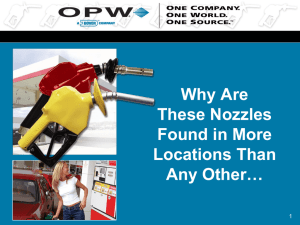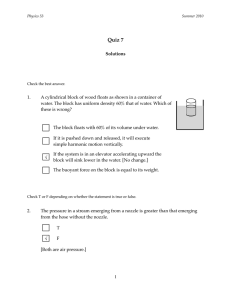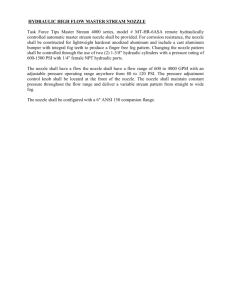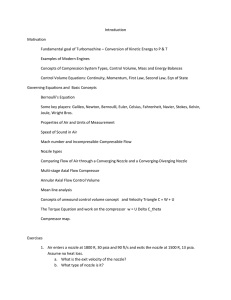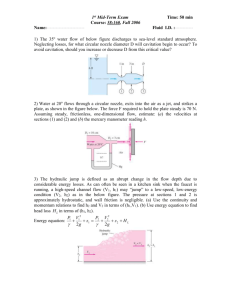Document
advertisement
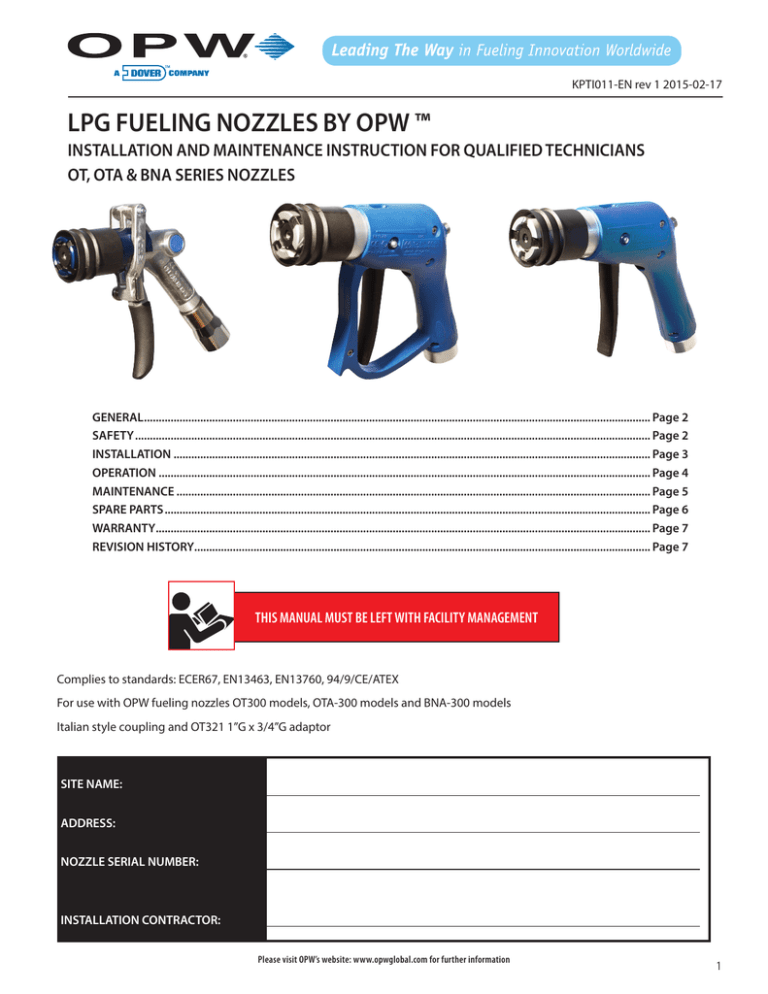
KPTI011-EN rev 1 2015-02-17 LPG FUELING NOZZLES BY OPW ™ INSTALLATION AND MAINTENANCE INSTRUCTION FOR QUALIFIED TECHNICIANS OT, OTA & BNA SERIES NOZZLES GENERAL............................................................................................................................................................................ Page 2 SAFETY............................................................................................................................................................................... Page 2 INSTALLATION.................................................................................................................................................................. Page 3 OPERATION....................................................................................................................................................................... Page 4 MAINTENANCE................................................................................................................................................................. Page 5 SPARE PARTS..................................................................................................................................................................... Page 6 WARRANTY........................................................................................................................................................................ Page 7 REVISION HISTORY.......................................................................................................................................................... Page 7 THIS MANUAL MUST BE LEFT WITH FACILITY MANAGEMENT Complies to standards: ECER67, EN13463, EN13760, 94/9/CE/ATEX For use with OPW fueling nozzles OT300 models, OTA-300 models and BNA-300 models Italian style coupling and OT321 1”G x 3/4”G adaptor SITE NAME: ADDRESS: NOZZLE SERIAL NUMBER: INSTALLATION CONTRACTOR: Please visit OPW’s website: www.opwglobal.com for further information 1 GENERAL/SAFETY KPTI011-EN rev 1 2015-02-17 1. GENERAL The LPG fueling nozzles are designed to be used for filling LPG vehicles in an operating temperature range of -40°C to 85°C (-40°F to 185°F). Nozzle type Receptacles type Lock release type OT300 models Italian type dish coupler Button on side of lever OTA-300 models Button on side of lever BNA-300 models Push button on body Note: due to the difference in receptacles types, nozzles can only connect to one type of receptacle. The pumping system needs to be switched off prior to connection and disconnection. These nozzles have a design feature to vent any trapped LPG gas/vapor betseen the vehicle coupler and the nozzle exhaust valve. This feature depends on proper operation of the nozzle and the pumping system. These nozzles are only intended for operation at the following service temperatures: Nozzle type Maximum service pressure Nominal service weight OT300 models 24 bar (350 psi) 1.45 kg (3.1 lbs) LPG discharge on disconnection 4.3 cm3 OTA-300 models 24 bar (350 psi) 1.45 kg (3.1 lbs) > 1 cm3 BNA-300 models 24 bar (350 psi) 1.55 kg (3.41 lbs) 1.6 kg (3.52 lbs) > 1 cm3 All OPW series nozzles require special installation precautions to ensure safe and reliable operation. The installation shall confirm to the requirements of the authorities having jurisdiction. In absence of requirements, the installation shall comply with standards for LPG vehicle fueling systems. OPW products should be used in compliance with applicable European, national and local laws and regulations. Product selection shall be based on physical specifications and limitations, and compability with the environment and material to be handled. OPW reserves the right to change specifications at any time without incurring obligations. 2. SAFETY Protective equipment needed: Safety instructions: Leather gloves Safety glasses Face shield Closed toe safety shoes Installation to be performed by authorized personnel only Do not smoke or use any open fire or electrical devices that can cause a spark Check nozzle for proper operation Make sure swivel and lever move freely Exhaust (front) gasket must be in place and fully inserted Hose, nozzle and swivel must have new O-rings in place prior to installation WARNING: Make sure hose and nozzle are depressurized before performing maintenance or removing nozzle! 2 Please visit OPW’s website: www.opwglobal.com for further information INSTALLATION KPTI011-EN rev 1 2015-02-17 3. INSTALLATION The inlet and seal for these self-service nozzles are as follows: Nozzle Inlet OT300 models OTA-300 models 1” Gas (1”-11 BSPP) In compliance with ISO 228-1 BNA-300 models All O-rings are suitable for use in LPG environments at stated operating temperature. Adaptor Inlet Outlet OT321 3/4” Gas female 1” Gas male 1” Gas (1”-11 BSPP) 3/4” Gas (3/4”-14 BSPP) Adaptor OT321 1.Make sure that the correct size sealing O-rings are mounted on the male fitting (1” Gas or 3/4” Gas) according to the fitting and O-ring manufacturers instruction. It’s recommended to use a Buna (NBR) rubber compound specified for use with LPG, and all compressor oils including synthetic oils. An O-ring with durometer from 70-90 Shore “A” is preferred. OPW provides proper O-rings with all new nozzles and adaptors. 2.Only connect LPG nozzles to certified hoses according to EN1762. 3.Turn off pumping system, follow good safety practices. Lock and tag out system during installation and repair of fueling nozzles. 4.Make sure that all sealing surfaces on nozzle and hose are clean, smooth and free from other containments. 5.Check O-ring inside the end of the nozzle and end of hose. O-rings can not be torn, knicked, twisted or have any other discontinuous feature.Both O-rings must be replaced after each disassembly. Make sure you lightly lubricate them before installation. Use greasing compatible with LPG. 6.The nozzle hose connection should be tightened according to the following: Nozzle type Type of wrench Torque required 38 mm (1½”) 27 Nm to 40 Nm (20 ft-lbs to 30 ft-lbs) OT300 models OTA-300 models BNA-300 models Please visit OPW’s website: www.opwglobal.com for further information 3 INSTALLATION/OPERATION KPTI011-EN rev 1 2015-02-17 7.After installation, test the unit for leaks. The lever should be cycled a few times. Pressurize and test connection using a suitable leak detection. Test pressure should include low pressure, under 5 bar (75 psi) and up to the maximum service pressure of 24 bar (350 psi). 4. OPERATION 1.Make sure that you have the correct receptable for the specific nozzle type. 2.Remove receptacle dust cap, check receptacle functional status and look for any debris or dirt. 3.Remove the nozzle from the rest position and make sure that the lever is extended forward. This retracts jaws on Italian dish coupler and extends clamping sleeve on all models. 4.Verify that the outlet gasket is present and fully inserted. 5.Initial connection position: 2 2 3 3 1 1 On OT300 models and OTA300 models: On BNA-300 models: Squeeze the lever (1) and then slide the lock release (2) to the side to allow the lever to move forward (3). Squeeze the lever (1) and then push the lock release button (2) to allow the lever to move forward (3). Then release the lock release button. 6.While lever on the nozzle is forward, the nozzle is inserted into the Italian dish coupler. 7.Squeeze lever until the latch engages and locks the nozzle into place. 8.If the nozzle lever will not connect, or nozzle won’t lock into place, make sure that the supply hose and pumping system are unpressurized and the pumping system is “OFF”. 9.Make sure the nozzle is connected properly and firmly attached to the vehicle receptacle. 10.Turn the station dispenser “ON”. The vehicle is now being refueled. 11.When fueling is complete, turn the station dispenser “OFF”. 12.Release the nozzle locking latch. 4 Please visit OPW’s website: www.opwglobal.com for further information OPERATION/MAINTENANCE KPTI011-EN rev 1 2015-02-17 13.After lock latch is released, push or allow lever to move forward. 14.After the latch is released the nozzle can be pulled straight back and out of dish coupler. Nozzle can be returned back to restore position. 15.Put nozzle back to resting position on LPG dispenser in a clean protected area. 16.Put receptacle dust cover back on the vehicle. NOTE: There will be a slight venting of gas during disconnection. This is normal and should only be small and brief. If the vent is long and continuous, the main check valve in the nozzle is not working properly. The nozzle needs to be returned to a certified repair center for maintenance immediately. 5. MAINTENANCE These self service nozzles must be kept in a clean and protected area. The nozzle must not be exposed to debris, dirt, water or chemicals. Service life is dependent on handling and care of nozzles. Unusual operation must be reported to the service represenative immediately. Routine maintenance: 1.Inspect the jaws and clean any dirt, grease or oil from the front gasket and jaws using a lint free cloth. Do not use any solvents as this may degrade the seals performance integrity and create a risk for personal injury with subsequent use. 2.The entire nozzle should be cleaned and moving parts lubricated periodically by fueling attendant or service personnel. This should occur on average once per six (6) months or more frequently if the nozzle is constantly in use or is used under extremely dirty conditions. Grease moving parts with grease compatible with LPG. 3.The lever mechanism, latch, jaws and swivel should all move freely. These should be checked for proper operation daily. If any parts are not operating properly, contact a service representative immediately. 4.The front gasket should be replaced by stage of wear. After two (2) years of service: The unit should be returned to a qualified repair center for a replacement of all seals and worn parts. This period should be reduced to twelve (12) months or less, if there is a risk that the nozzle has been misused, abused or if the nozzle is used in extreme environmental surroundings. Special tools and care are required to clean and repair/rebuild elements of the nozzle. Due to safety and performance reasons, only qualified technicians can service the nozzles. Only OPW original spare parts, seals and sub-assemblies are allowed to be used during the service of any OPW LPG product. Please visit OPW’s website: www.opwglobal.com for further information 5 SPARE PARTS 6. SPARE PARTS 6 Please visit OPW’s website: www.opwglobal.com for further information KPTI011-EN rev 1 2015-02-17 WARRANTY/REVISION HISTORY KPTI011-EN rev 1 2015-02-17 7. PRODUCT WARRANTY OPW warrants that products sold by it are free from defects in materials and workmanship for a period of one (1) year from the date of shipment by OPW. As the exclusive remedy under this limited warranty, OPW, will at its sole discretion, repair, replace or issue credit for future orders for any product that may prove defective within the one year period. This warranty shall not apply to any product which has been altered, repaired by any party other than a service representative authorized by OPW, or when failure is due to misuse, conditions of use, or improper installation and maintenance. OPW shall in no instance have any liability whatsoever for special, incidental, or consequential damages to any part, and shall have no liability for the cost of labour, fright, excavation, clean up, downtime removal, reinstallation, loss of profit or any other cost or charges in excess of the amount of the invoice for the products. Gasket and jaws are consumer’s goods and their wearing is depending on frequency of usage. THIS WARRANTY IS IN LIEU OF ALL OTHER WARRANTIES, EXPRESS OR IMPLIED, AND SPECIFICALLY THE WARRANTIES OF MERCHANTABILITY AND FITNESS FOR A PARTICULAR PURPOSE. THERE ARE NO WARRANTIES WHICH EXTEND BEYOND THE DESCRIPTION ON THE FACE HEREOF. 8. REVISION HISTORY Revision number Date Description Approved by 0 2015-02-05 EMEA layout and adaption David Kiklhorn 1 2015-02-17 New spare part illustration David Kiklhorn Please visit OPW’s website: www.opwglobal.com for further information 7 KPTI011-EN rev 1 2015-02-17 8 Please visit OPW’s website: www.opwglobal.com for further information
